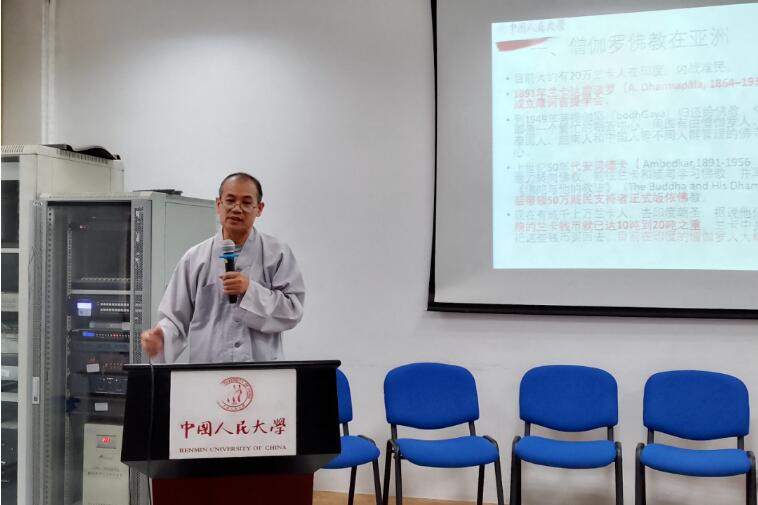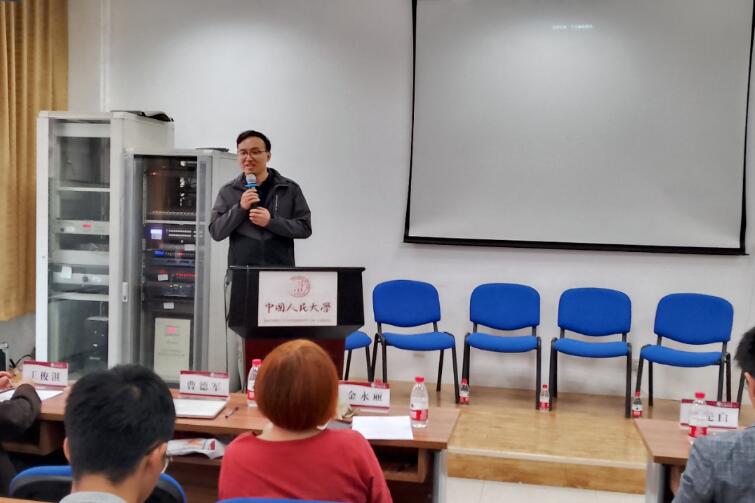On October 12, “South Asian Studies from the Interdisciplinary Perspective” – the first academic salon on South Asian Studies at the Regional and National Research Institute of Renmin University of China was successfully held. This salon is not only an internal exchange of teachers related to South Asia studies in Renmin University of China, but also a collective appearance of some South Asia teaching and research forces in the university. The Salon fully reflects the interdisciplinary characteristics of regional and country studies, and adopts the “2+2+2” model in combination with the advantages of Renmin University itself. Two teachers from the School of International Relations, the School of History and the School of Philosophy each participated in the salon. The academic salon was hosted by Professor Wang Zhaodong, lecturer of the School of International Relations.
Professor Ji Xianbai, associate professor of the School of International Relations and deputy leader of the Preparatory group of the Regional National Research Institute, first made a guiding speech for the academic salon. Mr. Ji warmly welcomed the speakers and the participating teachers and students inside and outside the university, and focused on the long history and outstanding achievements of Renmin University’s regional and country studies, as well as the school’s overall planning and construction ideas for regional and country studies, and its support and expectations for the direction of South Asian regional studies.
Sharon then moved on to the keynote. Jin Yongli, associate professor of the School of History, gave a report entitled “The ‘Dual Mission’ in the Field of Indian History Writing since Modern Times”, especially emphasizing the “breaking” and “establishing” of modern Indian history writing: breaking the religious color of traditional history writing, and establishing the scientific, rational and national writing of modern history. Teacher Jin believes that between “breaking” and “establishing”, it has not only brought constructive but also destructive influence to the writing of Indian history.
Professor Wei Shan of the Faculty of Philosophy introduced the world spread of contemporary Sri Lankan Buddhism. Although Sri Lanka is a weak and small country, Sinhalese Buddhism has achieved significant overseas spread through the power of the people. Recent years have seen rapid growth of Sinhalese Buddhists in Malaysia, Singapore, Taiwan, the United Kingdom, Germany, and North America. The Sri Lankan government has also changed the policy of restricting immigration, recognized dual citizenship, encouraged overseas development of Chinese, and awarded honors to outstanding overseas nationals, encouraging them to contribute to the motherland and promote development, which has played a good effect.
Wang Junqi, associate professor of the School of Philosophy, discusses the advantages and feasibility of Sanskrit as a tool to construct Indian nationalism with the title “The Dispute of National Name and Sanskrit Nationalism in India”. After a brief introduction to the history of the popularity of Sanskrit in ancient India, Mr. Wang focused on the revival of Sanskrit in India in recent years, and the Sanskrit culture in both academic and everyday writing in India. This is supported by both academic and national policies. Wang argues that Sanskrit nationalism, with its wider reach and deeper historical basis than Hindu nationalism, is better placed to be an effective way of unifying Indian democracy.
Cao Dejun, associate professor of the School of International Relations, published a report entitled “Reflections on the Discipline Construction of Regional and Country Studies”. He first summarized the past, present and future of national studies, looked forward to the important position of South Asia in future studies, and stressed the importance of Indian studies from two aspects. Cao Dejun put forward three directions for regional and country development: “humanistic orientation, scientific orientation and specific orientation”, pointing out that regional and country studies should pay attention to both knowledge production and policy research, the former being the basis of the latter.
Wu Lingjing, lecturer of the School of History, mainly introduced the ecological network of sandalwood trade in modern India, and sort out how the trade of sandalwood in Mysore, India, emerged, how to develop abroad and how to eventually form an “ecological cultural network” of global sandalwood trade. Mr. Wu summed it up into five stages: initial rise, Empire 1 (fluctuating development period), Empire 2 (resource control), Empire 3 (difficult transformation) and resource crisis period.
Wang Zhaodong, a lecturer at the Institute of International Relations, commented on the nature of the “border heritage” of British India, arguing that it was not a modern border, but a multi-layered border system between frontier and border. He pointed out that after independence, India interpreted the multi-layered boundary system with the boundary as one of the important reasons for the Sino-Indian border conflict. The boundary issue has a dual meaning for India. The boundary that is under vague external control and ignored in colonial times, and the internal centralization of the frontier tribal areas that were formerly free from federal jurisdiction are closely related to the construction of the Indian nation state in the post-colonial era.
After the keynote address, the speakers engaged in intense and in-depth discussions with the audience on the soft power of Buddhism in Sri Lanka, Sikh separatism, strategic culture in India and other issues. The academic salon was a complete success.











